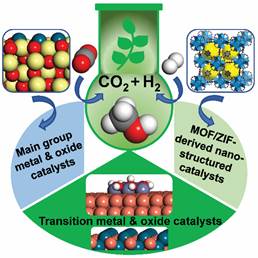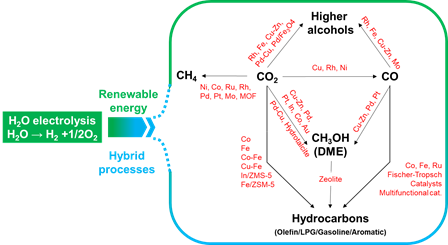Date:Apr 28, 2020
Source: School of Chemical Engineering
By Li Xiang, Guo Xinwen
Recently, in collaboration with Dr. Xiao Jiang from Georgia Institute of Technology, Prof. Thomas P. Senftle from Rice University, and Prof. Jingguang Chen from Columbia University, Prof. Xinwen Guo’s research team of School of Chemical Engineering at DUT has made great progress in CO2 catalytic conversion and produced a series of innovative results. Representative achievements are published in top international journals of Chemistry and Catalysis: Chemical Reviews, Advances in Catalysis, Journal of Catalysis, and ACS Catalysis.
(1) Review on CO2 Hydrogenation to Methanol
Recently, Prof. Xinwen Guo’s research team at DUT and collaborators contributed an important review on the importance of catalyst performance, catalyst structure-activity relationship, understanding reaction mechanism, and determining key calculation parameters for designing efficient catalysts in CO2 hydrogenation to methanol. This paper has been published in Chemical Reviews ().

(2) Review on CO2 Hydrogenation to Alcohols and Hydrocarbons
Based on the research achievements of metal-based catalysts in the past decade, Prof. Xinwen Guo’s team at DUT and collaborators reviewed the research progress of heterogeneous catalytic CO2 hydrogenation to alcohols and hydrocarbons. Recent studies on key factors affecting the activity and selectivity of CO2 conversion, such as metal type, support, catalyst composition, and the understanding of structure-activity relationship between reaction pathways and catalysts are systematically reviewed. This paper has been published in Advances in Catalysis (2019, 65, 121–233).

(3) Research Progress in CO2 Catalytic Conversion
Indium oxide (In2O3) based catalyst exhibits excellent performance in catalytic hydrogenation of CO2 to methanol. Recently, Prof. Xinwen Guo’s team at DUT and collaborators revealed the key role of water in methanol synthesis by combining the catalytic experiments with density functional theory (DFT) calculations. This work provides new insight and research basis for understanding the mechanism of how the addition of extra H2O can promote the conversion of CO2 to CH3OH by tuning the surface structure and property of In2O3/ZrO2 catalyst. The interesting results have been published in Journal of Catalysis (2020, 383, 283–296).
Understanding the structure-catalytic activity relationship is crucial for developing novel and efficient catalysts with desired performance. Recently, Prof. Xinwen Guo’s research team at DUT and collaborators reported the importance of the crystal phase of In2O3 catalyst in the reaction of reverse water gas shift (RWGS) by using the methods of catalytic experiment and DFT calculation, providing new insight for the understanding and design of efficient RWGS catalysts. This work has been published in the cover of ACS Catalysis (2020, 10, 5, 3264-3273).

Editor: Li Xiang